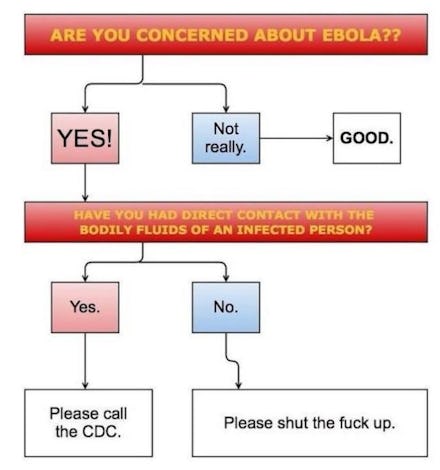Are You Worried About an Ebola Outbreak in America? Check This Helpful Chart

The news: A lot of Americans are anxiously buzzing about the deadly Ebola epidemic that's killed more than 700 people across West Africa.
The first Ebola victim to be brought to the United States from Africa arrived in Atlantic for treatement on Saturday. Doctors say they are confident the deadly virus won't escape, but fear that the outbreak could spread in the U.S. has generated considerable anxiety among some Americans.
Luckily, this clever chart tweeted by Boing Boing science editor Maggie Koerth-Baker provides a smart reality-check to panic stricken Americans hyperventilating over the risk of a deadly (and almost certainly cinematic) outrbeak.
Image Credit: Twitter
Here's the situation: While the current Ebola outbreak in West Africa is being called the deadliest in history, as this chart points out, America really don't have any serious cause for concern — despite what everyone on your Facebook newsfeed and article comments is telling you.
The chances of a worldwide pandemic are relatively low, especially since Ebola is hard to contract and requires direct contact with infected bodily fluids or contaminated objects. Additionally, the alarming contamination rates can at least somewhat be attributed to the facts that rural outbreak zones have low levels of sanitation.
Additionally Ebola is not an airborne disease and has low transmission rate, which coupled with quarantine techniques and border control measures, usually mean that outbreaks burn themselves out.
So why are people freaking out? Because even though there have been no reported cases in the U.S., the virus is spreading rapidly within Africa. Since March of this year, there have been cases in ten African countries.
On top of that, there's been a few developments that have resulted in increased media coverage. The World Health Organization (WHO) recently reported a death toll of 729 out of 1,300 infected cases. Dr. Sheik Umar Khan, who was leading the fight against Ebola in Sierra Leone, contracted it himself and died on Tuesday, and American aid worker, Dr. Kent Brantly became infected while working in the region and is now being treated in the U.S. in an infectious disease hospital in Atlanta, Georgia.
What is being done to fight the epidemic? Doctors Without Borders have been working with anthropologists to help deal with a local culture clash in West Africa that has prevented a lot of efforts to teach about prevention and transmission of the disease. And WHO is holding information sessions with local leaders so they can be better educated about Ebola.
However, one thing that is definitely not helping the fight is the mass amounts of American panic and hysteria over a virus that's, for the most part, contained thousands of miles away.
Since it is highly unlikely that there will be an Ebola virus outbreak in the U.S., people should, as Koerth-Baker's chart says, "shut the fuck up" about it already. Freaking out over a single patient isn't helping those battling the disease in Africa, and helping the fight and contain against the epidemic is where our focus should lie.